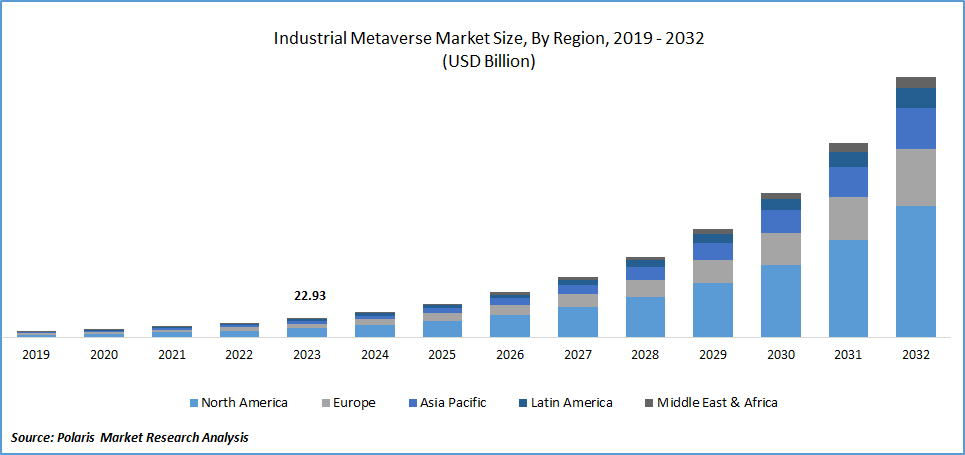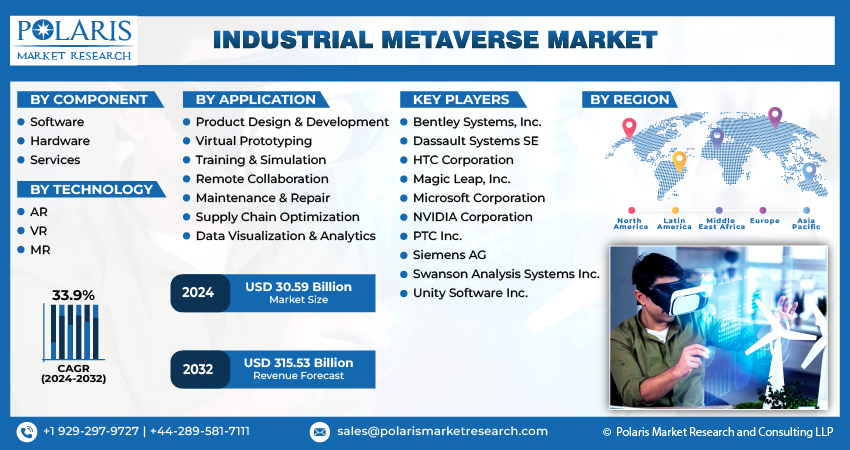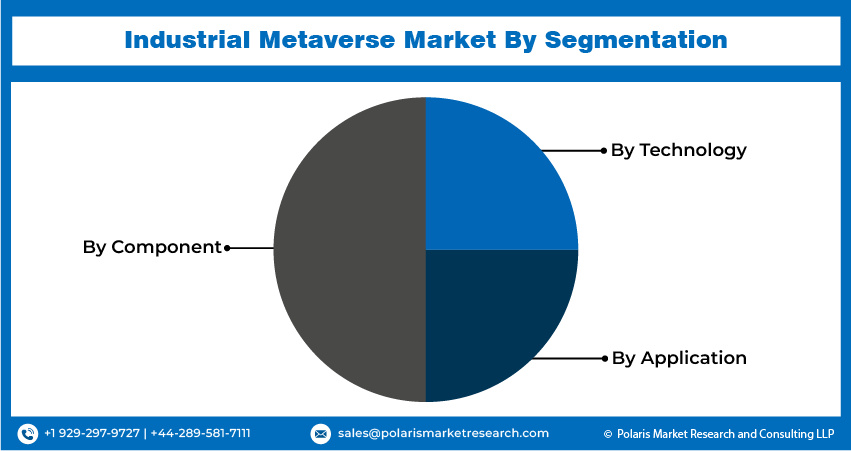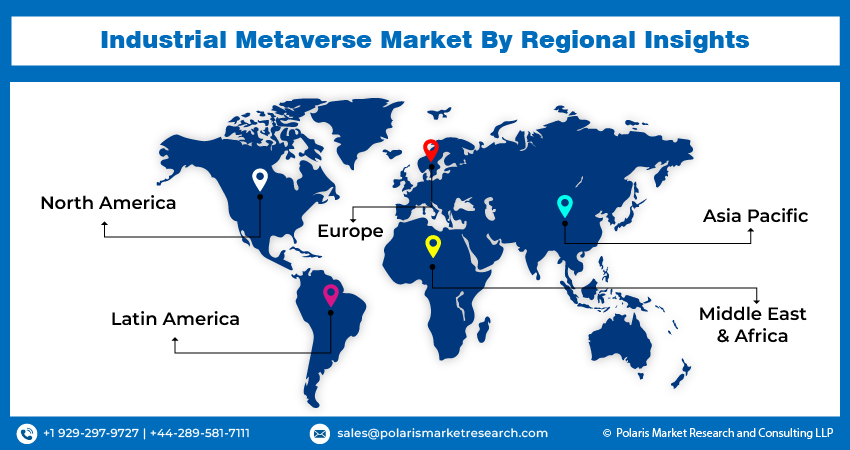
Industrial Metaverse Market Share, Size, Trends, Industry Analysis Report, By Component (Software, Hardware, Service); By Technology; By Application; By Region; Segment Forecasts, 2024 - 2032
- Published Date:Mar-2024
- Pages: 117
- Format: PDF
- Report ID: PM4402
- Base Year: 2023
- Historical Data: 2019-2022
Report Outlook
The global industrial metaverse market was valued at USD 22.93 billion in 2023 and is expected to grow at a CAGR of 33.9% during the forecast period.
Growth is due to rising interest in digital twins, as they excel in providing solutions for predictive maintenance, enhancing design and prototyping workflows, facilitating data-centric decision-making, seamlessly integrating with IoT and AI technologies, fostering collaborative efforts, ensuring regulatory compliance, and generating substantial cost efficiencies. Digital twins are poised to play a crucial role in streamlining operations and driving innovation.
The initial advantages of embracing the industrial metaverse are evident in design and engineering, testing and validation, and training. In design and engineering, the industrial metaverse facilitates immediate insights into the impact of design changes by distributed teams across various disciplines throughout the entire organization. For testing and validation, the combination of photo-realistic environments with multi-physics simulations allows the testing of various scenarios and the training of autonomous systems using machine learning and synthetic data.

To Understand More About this Research:Request a Free Sample Report
Industry pioneers are actively exploring the potential of the industrial metaverse to unveil innovative interaction and business models. For instance, a multinational oil and gas company is employing virtual reality (VR) to train its employees in safety for deep-water oil production. The utilization of VR enables the efficient transfer of knowledge between teams, resulting in significant time savings. In another instance, a prominent defense equipment manufacturer is leveraging smart glasses to achieve outcomes 30% faster and enhance accuracy by 93%. Within pharmaceutical warehouses, professionals are now supported by head-mounted gear, reducing safety risks, enabling remote assistance, and facilitating quality assurance through remote audits and process improvement initiatives.
Industrial metaverse applications are transforming training methodologies through immersive experiences. Training programs utilizing virtual reality (VR) and augmented reality (AR) offer employees realistic, hands-on simulations, reducing the learning curve. This approach enhances skill development and safety for workers, enabling them to practice complex tasks without actual physical risks. The central themes of this trend revolve around "immersive training" and "VR-based learning." Organizations invest in tailored virtual training programs to ensure their employees are well-prepared for real-world scenarios.
Leading companies are leveraging industrial metaverse technologies to expedite their digital transformation, aiming for improved efficiency. For instance, Kawasaki Heavy Industries, which, in May 2022, unveiled the Kawasaki DX project. This initiative incorporates industrial metaverse technology provided by Microsoft. Kawasaki employs a digital twin within the Microsoft Azure cloud computing platform, and HoloLens mixed reality headset. This technology facilitates real-time troubleshooting and maintenance from any location, mitigating technical issues that could result in reduced production or downtime. The DX project aligns with Kawasaki's overarching strategy to realize Group Vision 2030, emphasizing heightened mobility, remote connectivity, and a commitment to energy and environmental sustainability.

Industry Dynamics
Growth Drivers
Increased Efficiency Through Digital Twin Technology Integration
The Industrial Metaverse Market has experienced a significant boost in efficiency, primarily attributed to the seamless integration of Digital Twin technology. This integration allows businesses to create virtual replicas of physical assets, processes, and systems, providing a comprehensive and real-time representation of their industrial operations.
By leveraging Digital Twins within the Industrial Metaverse, companies gain the ability to monitor, analyze, and optimize processes with unprecedented precision. This results in enhanced operational efficiency as organizations can identify bottlenecks, predict maintenance needs, and streamline workflows. The virtual representation also facilitates better decision-making by offering insights into performance metrics, ultimately contributing to improved overall productivity.
Furthermore, the synergy between the Industrial Metaverse and Digital Twins goes beyond mere efficiency gains. It empowers industries to explore innovative solutions, such as remote monitoring and control, augmented reality-based maintenance, and collaborative problem-solving in virtual environments. As a result, businesses can not only streamline their existing operations but also pave the way for transformative advancements in industrial practices. The integration of Digital Twins stands as a pivotal driver, propelling the Industrial Metaverse Market toward a future of enhanced performance and innovation.
Report Segmentation
The market is primarily segmented based on component, technology, application, and region.
|
By Component |
By Technology |
By Application |
By Region |
|
|
|
|
To Understand the Scope of this Report:Speak to Analyst
By Component Analysis
Hardware Segment Accounted for the Largest Market Share in 2023
The hardware segment accounted for the largest market share. This is primarily due to its pivotal role in facilitating immersive experiences, simulations, and data-driven decision-making across diverse industrial sectors. As businesses increasingly embrace industrial metaverse solutions, there is a growing demand for advanced hardware to support these applications, positioning the hardware segment as a key driver of the overall market's expansion.
The services segment will grow rapidly. A notable trend in the industrial metaverse hardware landscape is the emergence of wearable biometric sensors. These sensors can monitor workers' physiological and emotional states, offering valuable insights into their well-being and performance. Through the integration of biometric sensors into headsets, companies can prioritize the safety and comfort of their employees while simultaneously enhancing workflow efficiency.
By Technology Analysis
AR Segment Held a Significant Market Share in 2023
AR segment held a significant market share. It involves the growing embrace of AR integrated with digital twin technology. This integration entails the use of AR to overlay real-time data from sensors and IoT devices onto physical equipment, providing operators with immediate information about the condition and functionality of machinery. This approach facilitates proactive maintenance and contributes to a reduction in operational downtime.
MR segment is expected to gain a substantial growth rate. This is primarily due to the advancement of the holographic workspaces. These MR solutions generate interactive holograms and digital objects that users can manipulate within physical space. Holographic workspaces prove particularly beneficial for design and engineering tasks, providing professionals with a tangible means to interact with 3D models and prototypes.

Regional Insights
North America Dominated the Global Market in 2023
The global market is currently dominated by North America, which is witnessing a significant surge in the creation of immersive experiences, virtual events, and entertainment within the metaverse. This includes activities such as VR gaming, virtual concerts, and immersive storytelling experiences. Businesses are capitalizing on the increasing demand for immersive entertainment, promoting innovation, and making substantial investments in this sector.
The Asia Pacific will grow at a substantial pace. Educational institutions across the region are adopting AR and VR technologies to create immersive and interactive learning experiences. Students can engage in virtual tours of historical places, conduct science experiments in a virtual environment, and participate in realistic simulations to enhance their learning and retention of information.
Moreover, corporations in the region are leveraging the industrial metaverse for employee training purposes. This involves delivering hands-on experiences in virtual environments, allowing staff members to undergo training simulations and scenarios without the need for physical setups. The integration of AR and VR technologies in education and training within the industrial metaverse is enhancing the overall learning experience and providing practical, real-world applications for both students and professionals in the region.

Key Market Players & Competitive Insights
The market is characterized by intense competition, with a few global leaders commanding a substantial market share. The primary focus is on leading product innovations and cultivating strategic partnerships among key players in the industry. For instance, in October 2022, VTT launched its first project centered around the Human-Driven Industrial Metaverse. The primary goal was to initiate a discourse on reshaping the industrial work landscape through collaboration with a carefully selected group of eleven companies.
Some of the major players operating in the global market include:
- Bentley Systems, Inc.
- Dassault Systems SE
- HTC Corporation
- Magic Leap, Inc.
- Microsoft Corporation
- NVIDIA Corporation
- PTC Inc.
- Siemens AG
- Swanson Analysis Systems Inc.
- Unity Software Inc.
Recent Developments
- In August 2023, NVIDIA and Microsoft formed a collaborative alliance to expand the availability of industrial metaverse and artificial intelligence (AI) capabilities for Microsoft's enterprise customers using the Azure Cloud platform.
Industrial Metaverse Market Report Scope
|
Report Attributes |
Details |
|
Market size value in 2024 |
USD 30.59 billion |
|
Revenue Forecast in 2032 |
USD 315.53 billion |
|
CAGR |
33.9% from 2024 – 2032 |
|
Base year |
2023 |
|
Historical data |
2019 – 2022 |
|
Forecast period |
2024 – 2032 |
|
Quantitative units |
Revenue in USD billion and CAGR from 2024 to 2032 |
|
Segments Covered |
By Component, By Technology, By Application, By Region |
|
Regional scope |
North America, Europe, Asia Pacific, Latin America, Middle East & Africa |
|
Customization |
Report customization as per your requirements with respect to countries, regions, and segmentation. |
FAQ's
Industrial Metaverse Market report covering key segments are component, technology, application, and region.
Industrial Metaverse Market Size Worth $ 315.53 Billion By 2032.
The global industrial metaverse market is expected to grow at a CAGR of 33.9% during the forecast period.
North America is leading the global market.
The key driving factors in Industrial Metaverse Market are Increased Efficiency Through Digital Twin Technology Integration
